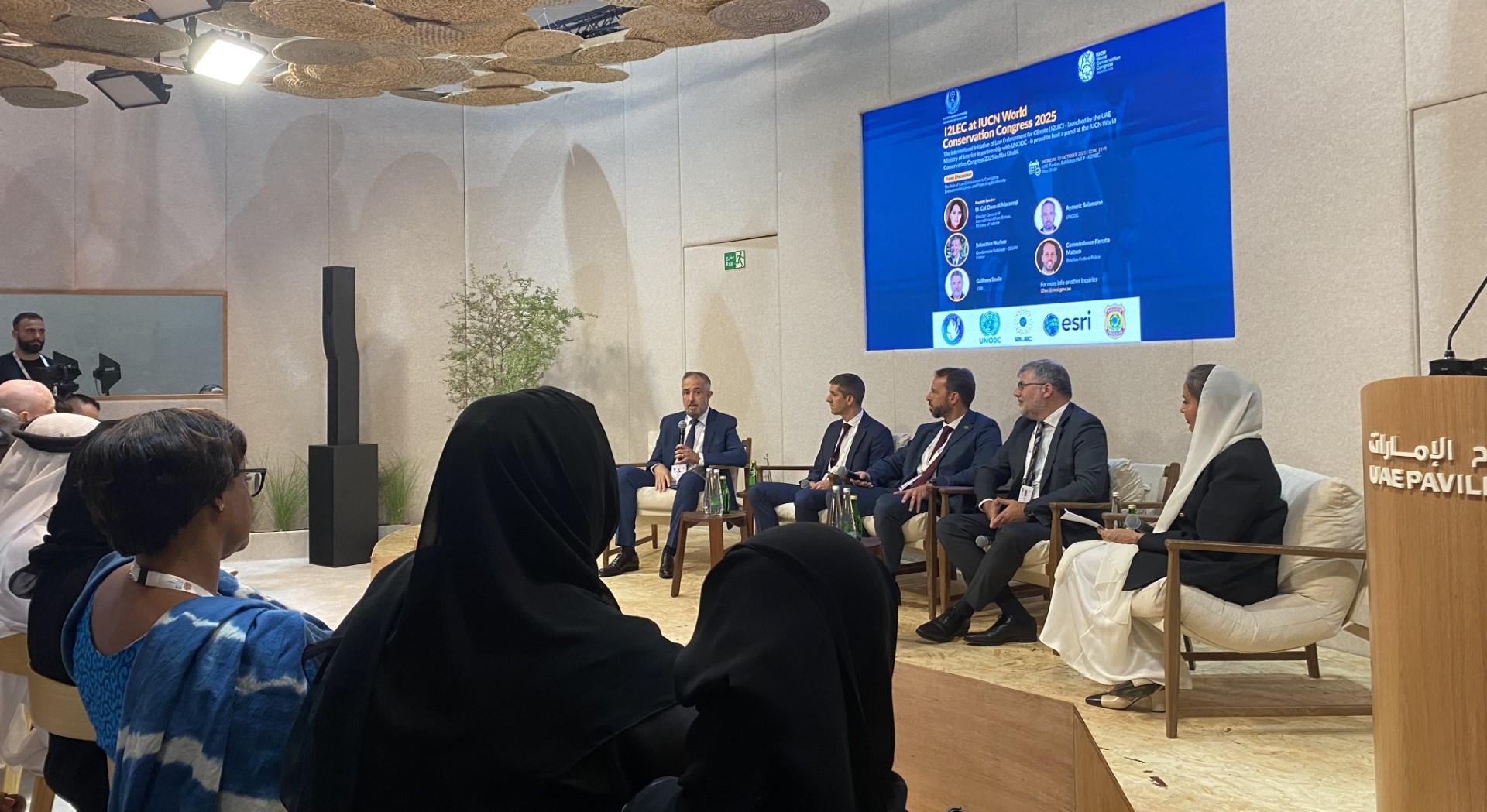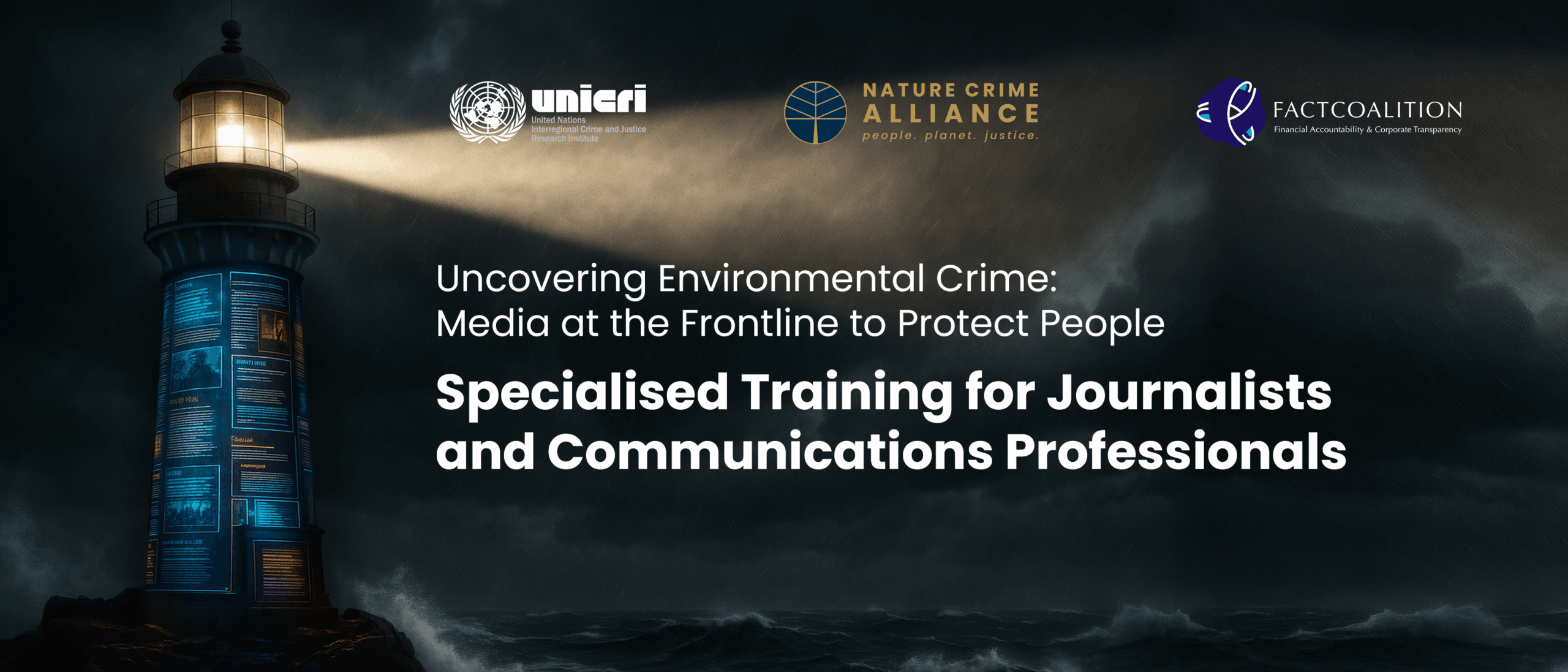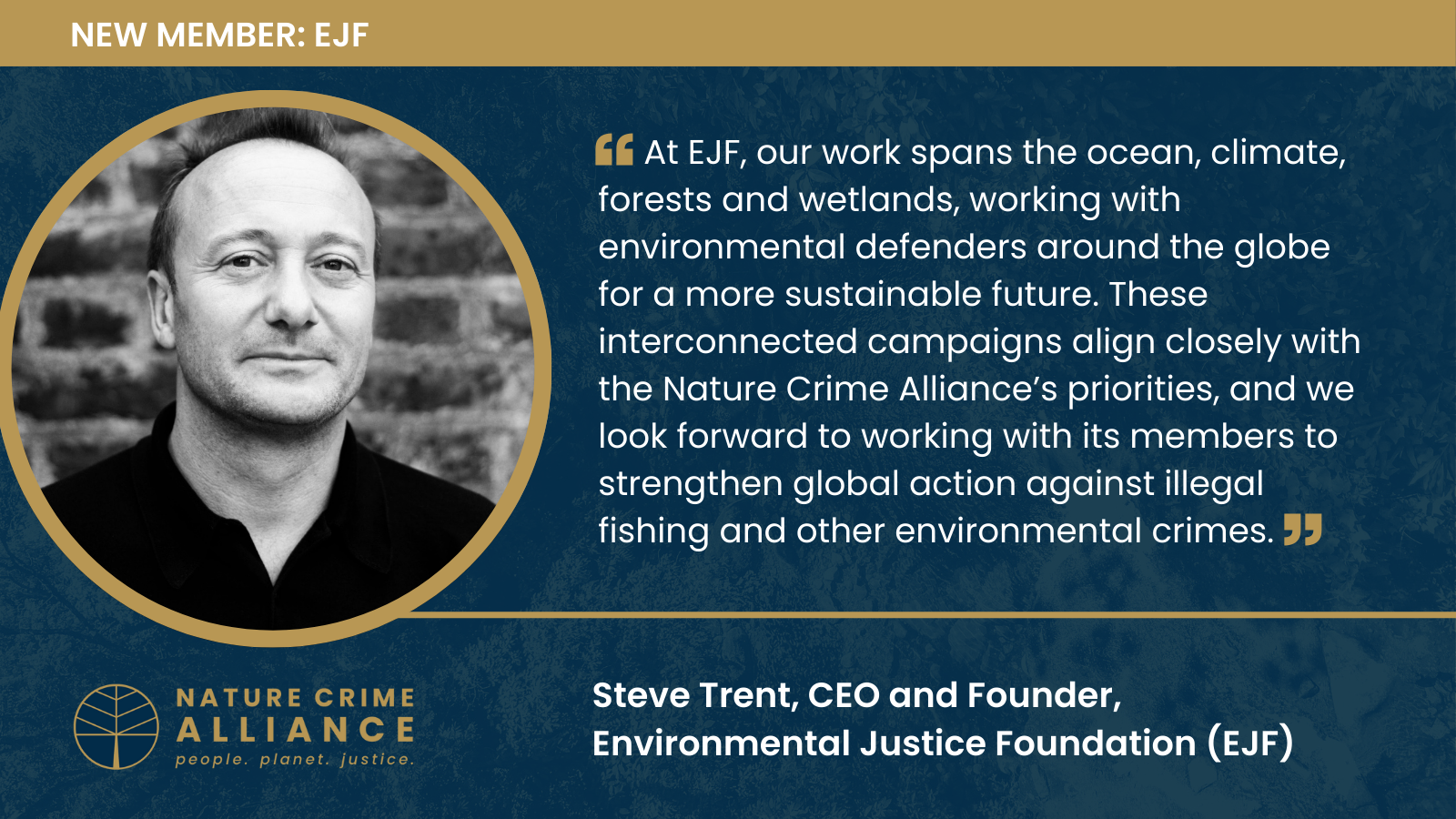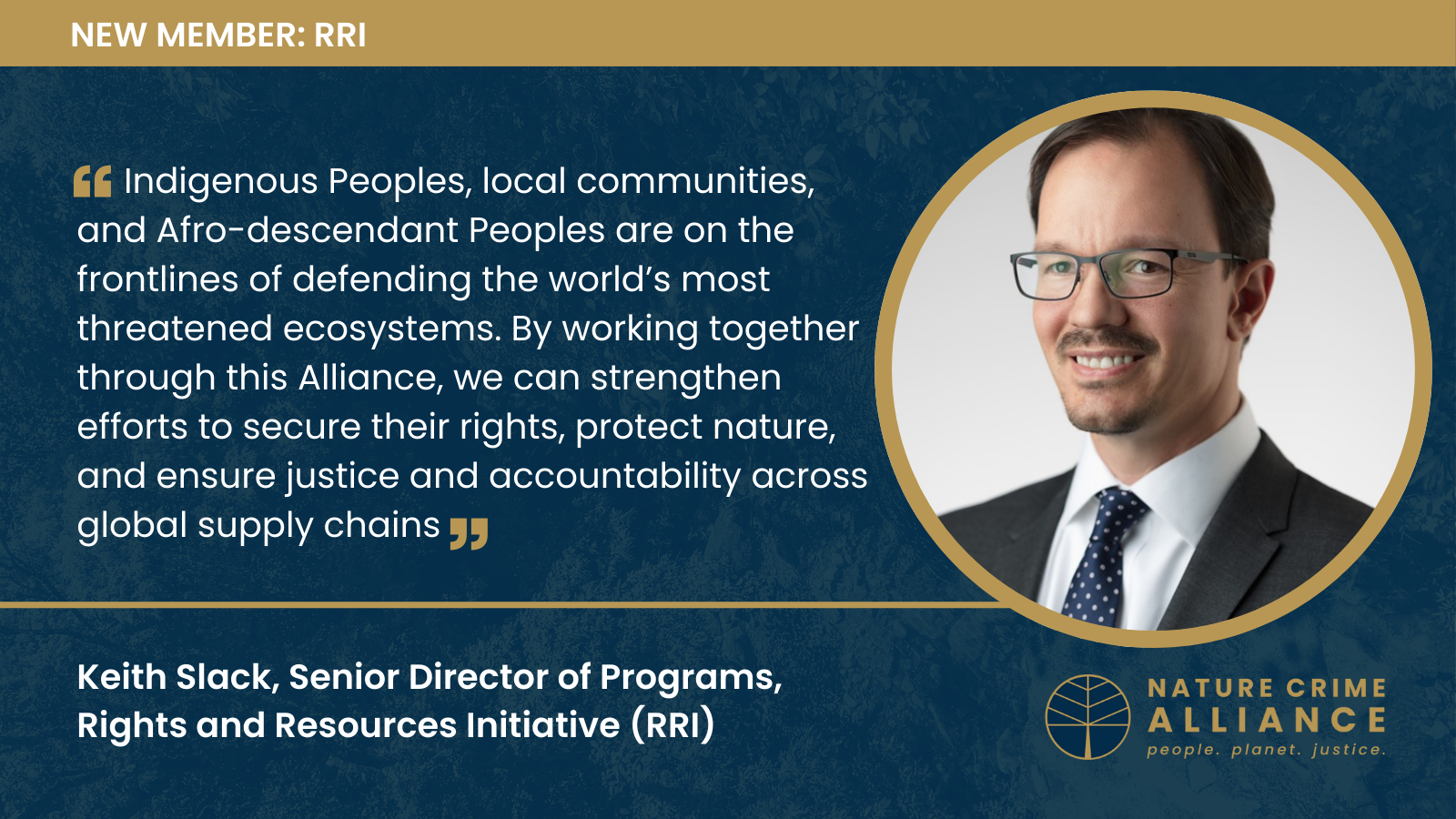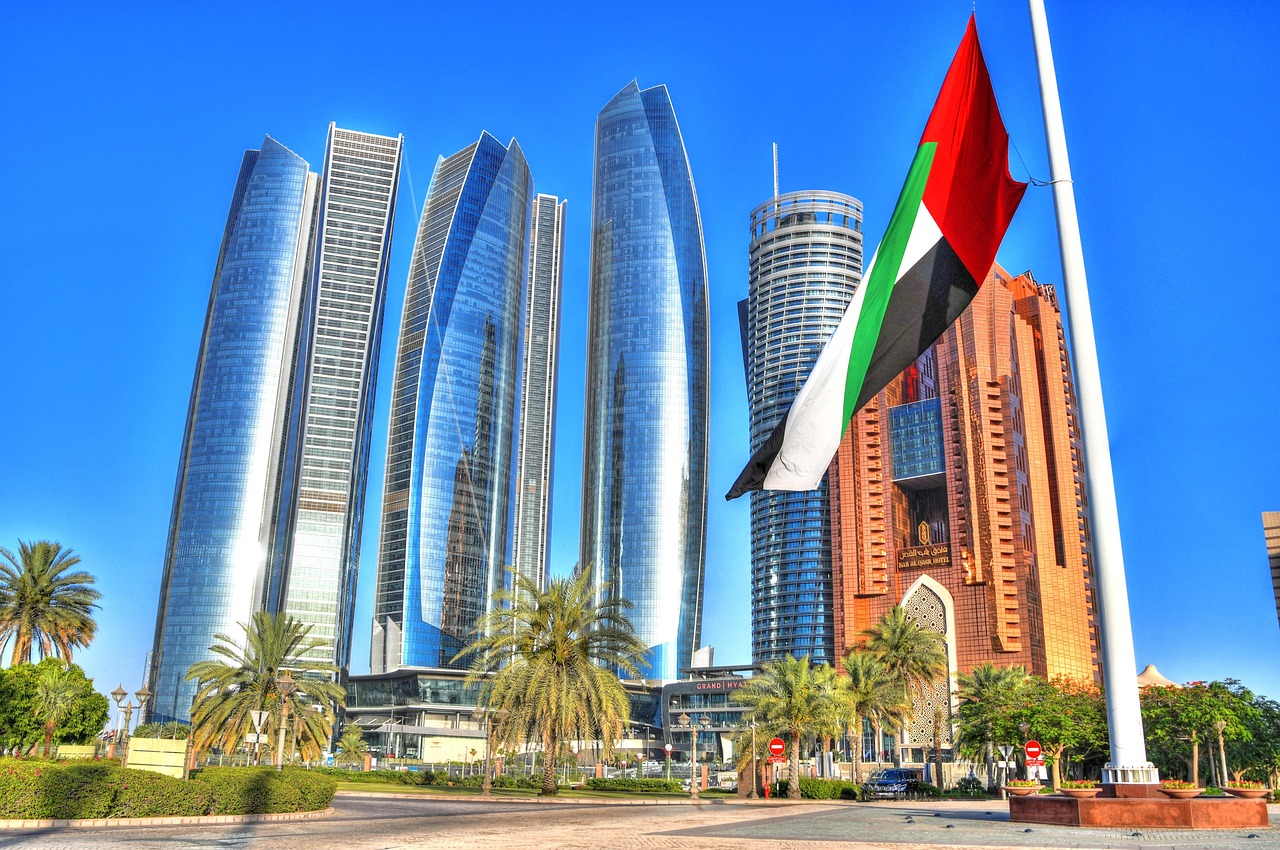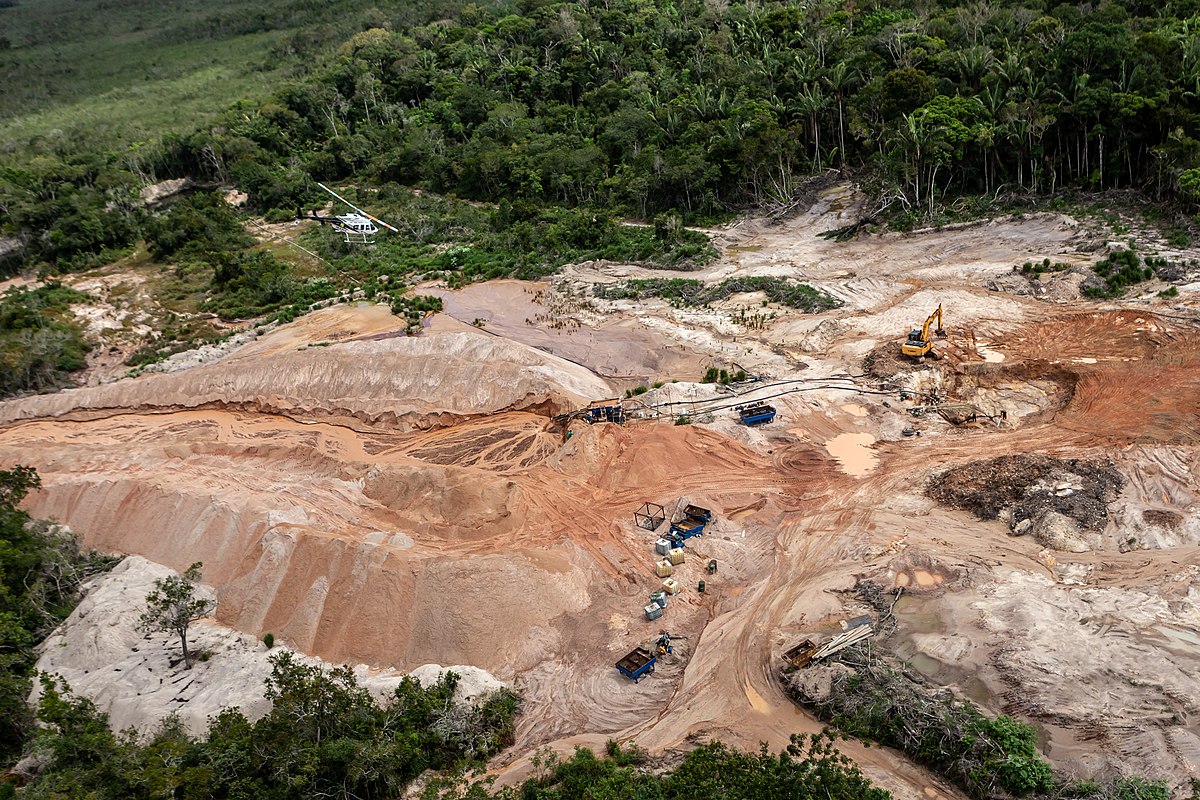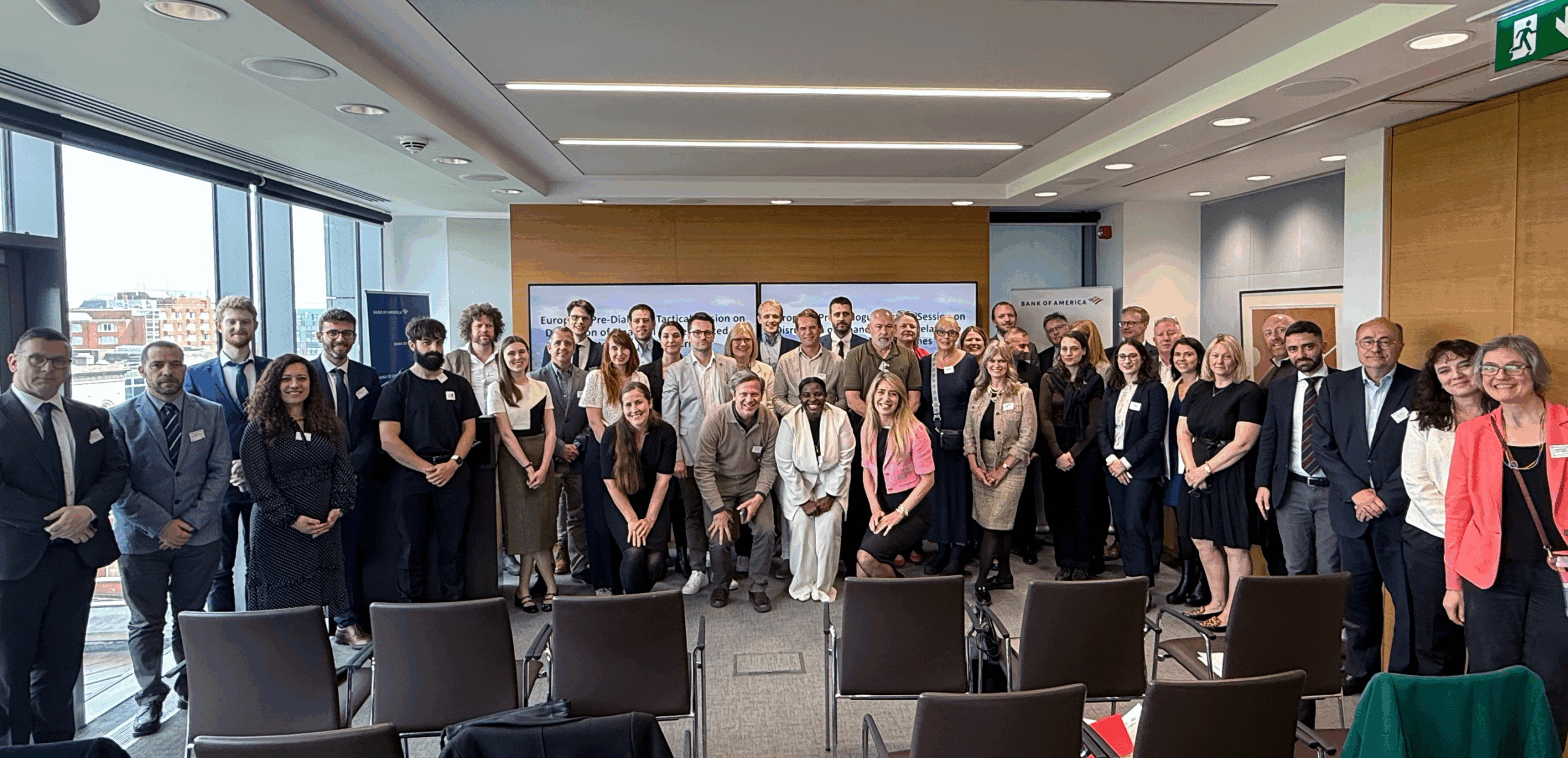Author: Luke Foddy
Building momentum: The IUCN World Conservation Congress and environmental crime
The IUCN World Conservation Congress (WCC) convened in Abu Dhabi this month, bringing together thousands of conservation practitioners, experts and policymakers.
The Nature Crime Alliance participated in the Congress in pursuit of its strategic aim to raise political will to tackle environmental crime, and to raise awareness of this issue among the conservation community.
New resolution on crimes that affect the environment
A highlight of the Congress was the adoption of motion 048/52 on Crimes that Affect the Environment.
The resolution recognises environmental crime as a major threat to biodiversity, climate goals and human rights, and calls for stronger cooperation between governments, law enforcement agencies, Indigenous Peoples and local communities, civil society, and the global conservation community to tackle crimes such as illegal logging, deforestation, mining, fishing and wildlife trafficking and related offences.
The resolution is the result of two merged motions developed ahead of the Congress – one led by the Government of France and the International Council on Environmental Law, and another led by World Resources Institute, through the Nature Crime Alliance, and its members including the Wildlife Conservation Society (WCS) and the National Whistleblower Center (NWC). Read more about the resolution here.
Thematic session on implementation
With the resolution adopted, the Alliance convened a thematic session during the Congress which aimed to capture insights from leading experts on how the landmark resolution can be integrated into IUCN members’ conservation strategies and activities.
‘Crimes Against the Environment and Nature Crimes – A Cross-Sectoral Challenge for Conservation and the Future of IUCN’s Mandate’, saw interventions from HE Alberto Alejandro Farje Orna, Peru’s Ambassador to the UAE; Dr Susan Lieberman, Vice President, International Policy, WCS; Andrea Carmen, Executive Director, International Indian Treaty Council and Karen Hulme, Chair of the IUCN World Commission on Environmental Law Specialist Group on Peace, Security and Conflict and a Professor at the University of Essex.
Moderated by Rogier van den Berg, Global Director, Ross Center for Sustainable Cities, WRI, the session brought in the views of participants during breakout discussions which surfaced a range of ideas, including the need for a designated point of contact within IUCN to coordinate, track and drive progress on this issue across the membership, and the establishment for an IUCN task force on crimes that affect the environment.
A directory of IUCN members who are working on the issue was also recommended, as was the need for closer alignment with other international fora and frameworks that address environmental crime. Read more about the session here.
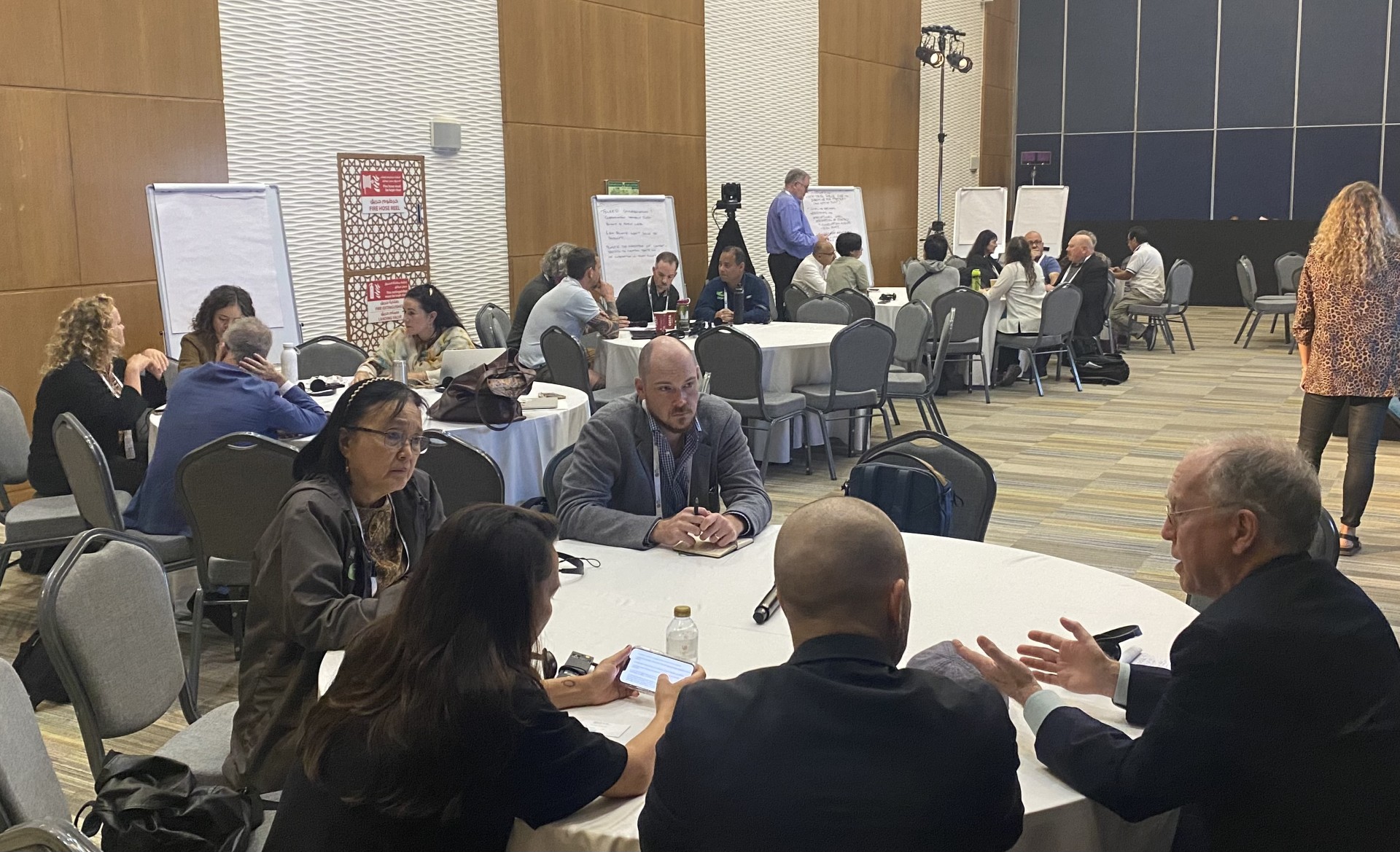
The Nature Crime Alliance gathered environmental crime practitioners to explore the implementation of the resolution into IUCN members’ activities.
Building momentum towards the UN Crime Congress
Such fora includes the UN Crime Congress, set to convene in Abu Dhabi in April 2026, where there is an opportunity to build on the IUCN resolution and keep environmental crime high on the agenda. A session convened by the Government of France in partnership with the Government of Peru, UNODC, the Wildlife Justice Commission, ICEL, WCS, WRI, NWC, the Alliance of NGOs on Crime Prevention and Criminal Justice, and the Global Initiative to End Wildlife Crime, highlighted how momentum is building in the fight against environmental crime across several UN frameworks, with the prospect of a ‘fourth protocol’ in the UN Convention against Transnational Organized Crime (UNTOC) the focus of much discussion.
A session on the role of law enforcement in fighting environmental, crime convened by the Interior Ministry of the UAE and featuring insights from the Ministry’s Foreign Affairs Bureau, the Federal Police of Brazil, the Gendarmerie Nationale (France), UNODC, and ESRI, also looked ahead to the UN Crime Congress as an opportunity to build international progress on this issue.
Environmental crime on the agenda
Members of the Alliance were also active at the Congress. IFAW convened a session on wildlife crime in Latin America which featured insights from TRAFFIC and WCS, while Earth League International hosted a podcast recording on environmental crime convergence that also featured IFAW.
Elsewhere, the World Bank’s Global Wildlife Program held a session on the role of behavioral change in driving positive conservation outcomes, including in the context of wildlife crime, and the Cheetah Conservation Fund also held a press call on new approaches to tackling wildlife crime in the Horn of Africa.
The efforts of these stakeholders is reflected in the Abu Dhabi Call to Action, issued at the end of the Congress, which includes reference to Crimes that Affect the Environment. We’re grateful to the efforts of our members, partners and other stakeholders who participated in the Congress to elevate environmental crime on the conservation agenda.
For more information, contact Luke Foddy, Communications Manager: luke.foddy@wri.org
Thematic session explores how IUCN can drive progress on crimes that affect the environment
Following the adoption of the Resolution on Crimes that Affect the Environment at the IUCN World Conservation Congress, the Nature Crime Alliance (hosted by World Resources Institute (WRI)) and its partners convened a thematic session exploring how action on environmental crime can be incorporated into the work of IUCN members.
‘Crimes Against the Environment and Nature Crimes – A Cross-Sectoral Challenge for Conservation and the Future of IUCN’s Mandate’, saw interventions from HE Alberto Alejandro Farje Orna, Peru’s Ambassador to the UAE; Dr Susan Lieberman, Vice President, International Policy, Wildlife Conservation Society (WCS); Andrea Carmen, Executive Director, International Indian Treaty Council (IITC) and Karen Hulme, Chair of the IUCN World Commission on Environmental Law (IUCN WCEL) Specialist Group on Peace, Security and Conflict and a Professor at the University of Essex.
Moderated by Rogier van den Berg, Global Director, Ross Center for Sustainable Cities, WRI, the discussion surfaced a range of pertinent issues across crimes that affect the environment.
A pressing global – and local – issue
Ambassador Farje Orna highlighted the importance of the IUCN Resolution on Crimes that Affect the Environment (048/52), noting that Peru was working with other states including Brazil and France to further this issue in other international fora.
Describing Peru as “an active member of the Nature Crime Alliance”, the Ambassador also shared his support of WRI’s call for environmental crime to be prominently highlighted at the UN Crime Congress in April 2026.
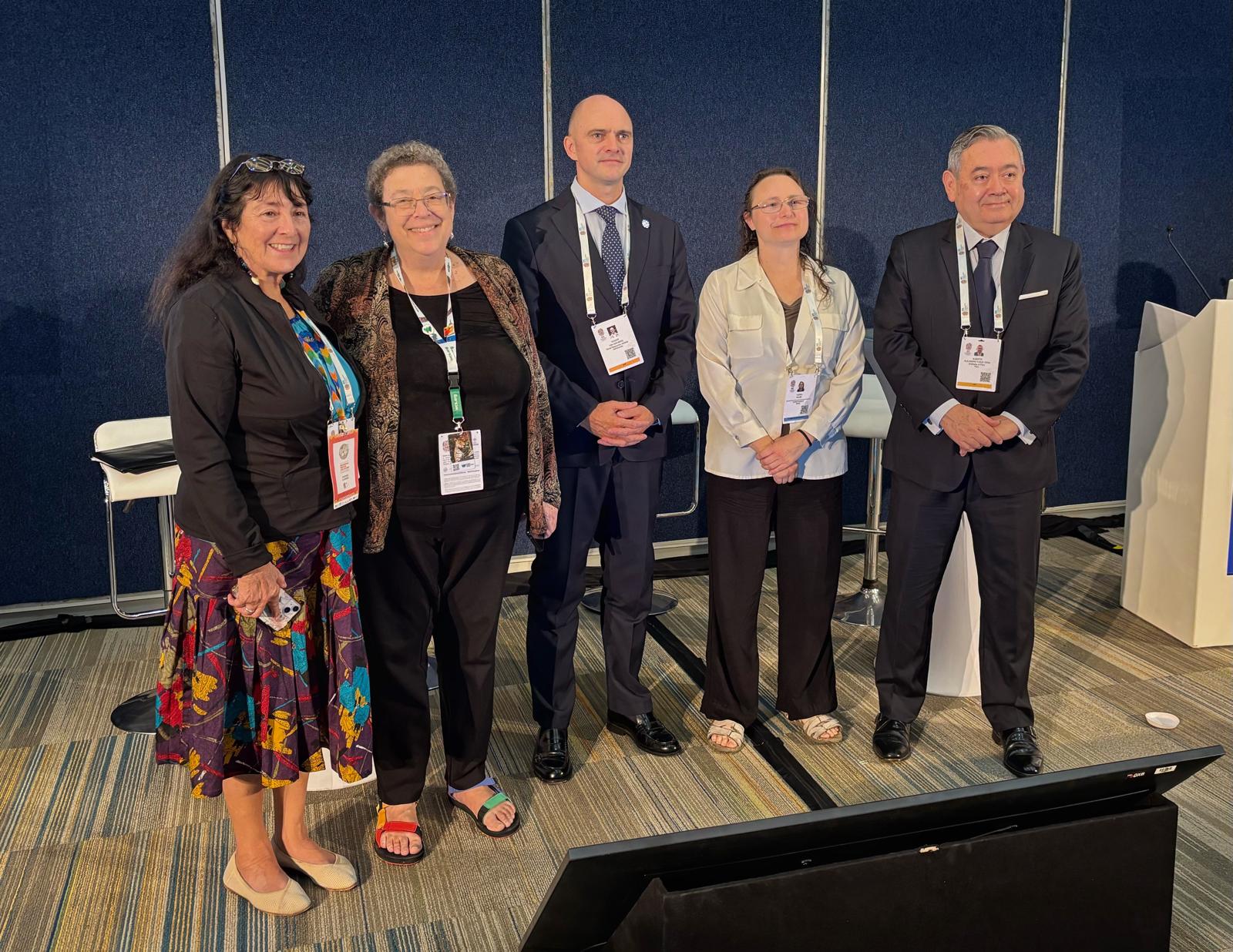
In a powerful intervention, Andrea Carmen, IITC, offered perspectives from Indigenous communities for whom this issue is very local. She highlighted the devastating effects of mining in the Sonoran Desert and the contamination that comes with such practices.
Carmen also noted that many acts of “environmental violence” are technically legal, presenting a major challenge for communities. Citing the words of a young member of the Apache community, Carmen said “Mother Nature is not dying. She is being murdered.”
Practical steps towards progress
Asked what IUCN members and other stakeholders can do to address crimes against the environment, Professor Karen Hulme, IUCN WCEL, noted the importance of international legal frameworks such as the UN Convention against Transnational Organised Crime (UNTOC).
Getting environmental crimes designated as serious organised crime under UNTOC is key, Hulme said, as this can unlock the resources and cross border support available to law enforcement under the Convention.
The thematic session also sought to capture insights from those in the room through a ‘World Café’ exercise. Participants gathered in groups to discuss two key questions: ‘What concrete ideas or actions would you suggest to strengthen collaboration among IUCN members on crimes that affect the environment?’, and, ‘How can IUCN members sustain momentum beyond the WCC and ensure these issues receive continued attention in other key international forums?’
Ideas surfaced included the need for a designated point of contact within IUCN to coordinate, track and drive progress on this issue across the membership, and the establishment for an IUCN task force on crimes that affect the environment. A directory of IUCN members who are working on the issue was also recommended.
Participants also highlighted the need for closer alignment with other international fora and frameworks that address environmental crime.
Multi-sector approach
Susan Lieberman, WCS, closed the session by emphasising the value of the resolution in raising the profile of environmental crime among IUCN, but added that the work starts now: we need to carry this forward into action. Collaboration between members and sectors will be key.
Held in partnership between the Government of Peru, IUCN WCEL, WRI, WCS, IITC, and the National Whistleblower Center, the session marked a key moment to reflect on the impact of resolution 048/52, and how it can drive positive change in the fight against environmental crime.
To learn more about the thematic session and the resolution, please contact Elodie Perrat, Senior Manager, Nature Crime Alliance, WRI: elodie.perrat@wri.org
IUCN Congress adopts landmark resolution on Crimes that Affect the Environment
A new Resolution on Crimes that Affect the Environment, co-coordinated by World Resources Institute through the Nature Crime Alliance and its partners, has been adopted at the IUCN World Conservation Congress in Abu Dhabi.
The resolution recognises environmental crime as a major threat to biodiversity, climate goals and human rights, and calls for stronger cooperation between governments, law enforcement agencies, Indigenous Peoples and local communities, civil society, and the global conservation community to tackle crimes such as illegal logging, deforestation, mining, fishing and wildlife trafficking and related offences.
How did the resolution come about?
In 2024, World Resources Institute (WRI) through its Nature Crime Alliance initiative, was invited by IUCN to mobilise its members around nature crime – a key subset of crimes that affect the environment (CAE) encompassing illegal logging, mining, fishing, and wildlife trade. Following workshops convened at the IUCN US Regional Conservation Forum, which recommended the development of a motion to strengthen IUCN’s engagement on this issue, WRI worked closely with Alliance members the Wildlife Conservation Society (WCS) and the National Whistleblower Center (NWC) to draft such a motion.
Separately, the Government of France and the International Council of Environmental Law (ICEL) developed a different motion on CAE. Given the complementary aims, proponents of both motions decided to merge them, resulting in Motion 048/52 on Crimes that Affect the Environment, which incorporates language from all parties and reflects broad member input. The resolution is therefore the product of two motions – one led by France and ICEL, the other by WRI and members of the Nature Crime Alliance including WCS and NWC.
The resolution also builds on the efforts of all partners to raise the profile of environmental crime across different international fora over recent years, including a session at UNEA6 convened by WRI and the Government of Norway that featured the Government of France and other partners, and an event at the UN Convention against Transnational Organised Crime COP12 that featured the Global Initiative to End Wildlife Crime.
Why does this resolution matter?
Environmental crime is one of the world’s most profitable illegal enterprises. It fuels deforestation, drives biodiversity loss, causes immense human suffering, and robs countries and communities of resources and revenue.
The resolution gives IUCN a mandate to address environmental crime in its workplan, and calls on the global conservation community to work together to tackle illicit activities such as illegal logging, mining, fishing, wildlife trafficking, and other forms of environmental crime.
Dr Susan Lieberman, Vice President, International Policy, WCS, said: “Governments and civil society must recognise that nature crime is not a peripheral issue. It strikes at the heart of conservation, governance, and human rights. This motion is an essential step toward building a global response equal to the scale of the threat.”
The resolution also recognises the role of those who shine light on environmental crime, often at great personal risk.
Scott Hajost, Senior Environmental Policy Adviser, National Whistleblower Center, and also Vice-chair of the IUCN US National Committee, said: “This resolution is key not just for getting crimes that affect the environment into IUCN’s work going forward, but also in highlighting the critical role of whistleblowers in exposing these crimes. It calls for states to promote whistleblower protection and incentives alongside broader efforts to address environmental crime.
“The Nature Crime Alliance has really been the glue that has bound us together in this process, providing a crucial focal point to coordinate members and other stakeholders, including governments, in developing the resolution. This outcome reflects the essential role of cross sector collaboration in the fight against crimes that affect the environment.”
A breakthrough resolution
Dr Charles ‘Chip’ Barber, Director, Nature Crime Alliance, WRI commented: “This resolution is a breakthrough because it puts action against these crimes squarely on the conservation agenda. It signals growing resolve among IUCN members to confront environmental crime as a serious threat to people, nature and climate.
“The resolution provides a mandate for IUCN to incorporate efforts to tackle environmental crime within its workplan and encourages governments to address this issue at the national level.
“This is a milestone that lays the groundwork for stronger global cooperation on environmental crime, aligns IUCN’s efforts with other international frameworks and fora, and builds momentum heading into the UN Crime Congress in 2026.”
For further information, please contact Elodie Perrat, Senior Manager, Nature Crime Alliance, WRI: elodie.perrat@wri.org
Alliance members deliver environmental crime trainings for journalists and media professionals
More than 100 journalists and communications professionals took part in a training course on environmental crime convened in partnership between the Nature Crime Alliance and its members the UN Interregional Crime and Justice Research Institute (UNICRI) and the FACT Coalition.
‘Uncovering Environmental Crimes: Specialised Trainings for Journalists and Communications Professionals’ aimed to provide practical insights into tools and approaches drawn from intelligence analysis, financial journalism, and conservation criminology.
Five members of the Alliance – UNICRI, FACT Coalition, WWF-UK, Earth League International, and World Resources Institute (WRI) – delivered training sessions, alongside experts from across journalism, academia and civil society.
Empowering media professionals to transform evidence into impact
The activity builds on UNICRI’s previous work supporting journalism on environmental crime, and aligns with the Nature Crime Alliance’s Strategic Communications priority area.
Marina Mazzini, Public Information Officer at UNICRI, who played a key role in convening the course, commented: “The trainings reflected UNICRI’s commitment to strengthening investigative capacities and fostering collaboration between journalists, civil society, and law enforcement to address crimes that affect the environment.
“Partnerships like this with the Nature Crime Alliance are essential to bridging the gap between data, policy, and public awareness.”
A wide-ranging curriculum
Day one, moderated by Paul Radu, Co-Founder and Head of Innovation at the Organised Crime and Corruption Reporting Project (OCCRP), featured opening remarks from Leif Villadsen, Acting Director of UNICRI, Julia Yansura, Environmental Crime and Illicit Finance Program Director, FACT Coalition, and Andrew Marshall, Chief Communications Officer, WRI.
The course kicked off with Dr Louise Shelley, Professor Emerita, George Mason University, providing an overview of environmental crimes and how they operate, before Julia Yansura from the FACT Coalition shared insights on the financial aspects of these crimes. John Dodsworth, Drivers Initiative Lead at WWF-UK, then introduced participants to the ‘Environmental Crimes Financial Toolkit’, which enables finance professionals, civil society actors and journalists to identify illegality risk.
The second day, moderated by Matthew Burnett-Stuart, Programme Officer, UNICRI, explored scientific and investigative techniques and approaches to environmental crime journalism, with Dr Meredith Gore, Professor and Research Director, University of Maryland, discussing ways to measure environmental crime and David Taylor, Adjunct Professor, Science Writing Program, Johns Hopkins University, exploring science-based storytelling.
Participants also heard insights from Emily Fishbein, a Network Fellow at the Pulitzer Center Rainforest Investigations Network, who shared learnings from her work reporting on illegal mining in Myanmar, and Andrea Crosta, Founder of Earth League International, who highlighted the importance of crime convergence while sharing tips on investigative approaches. Flaviano Bianchini, Founder and Director, Source International, closed day two with practical examples on how scientific data can be collected and used to support journalism.
The final day, moderated by Luke Foddy, Communications Manager, Nature Crime Alliance, introduced participants to the challenges of transboundary investigations during a session with Bruce Ohr, Executive Director of the International Wildlife Trust. Another key challenge facing journalists and communicators in the environmental space – disinformation – was addressed by Francesco Marelli and Katy Carroll, both from UNICRI’s CBRN Programme.
Day three concluded with presentations on satellite monitoring tools and their use for investigative journalism, with Ruth Nogueron, Senior Associate at WRI, demonstrating the value of the Global Forest Watch platform and Michela Corvino, Earth Observation Security Applications Engineer at the European Space Agency, highlighting the potential of Earth Observation technologies to support journalists’ work.
A multi-sector approach
Feedback from participants has been extremely positive, and future training courses are already under discussion, subject to funding. The range of expertise from different sectors was highlighted as a strength by participants, who noted that the mix of expert voices kept the sessions engaging.
Participants described the training as “really impressive”, highlighting the relevance of the content and the quality of the lecturers. One participant commented: “The training was great overall; the lecturers and the content were really impressive.”
Another emphasised the practical value of the sessions focused on financial investigation, noting: “The tools to ‘follow the money’ were really useful, especially seeing how organised crime groups and different types of transactions may be related.”
Luke Foddy, Communications Manager, Nature Crime Alliance, WRI, commented: “The Nature Crime Alliance was established to bring actors from different sectors together to share expertise and bolster collective efforts to fight environmental crime.
“These trainings, which fall under the Alliance’s Strategic Communications priority area, are an excellent example of this multi sector collaboration, and we are immensely grateful to UNICRI and the FACT Coalition for developing this course with us, and to our other partners who contributed to the sessions.”
Find out more about the Nature Crime Alliance’s Strategic Communications work
Alliance welcomes EJF to deepen global collaboration on illegal fishing
The Environmental Justice Foundation (EJF) has joined the Nature Crime Alliance to bolster global efforts to counter illegal fishing.
EJF is a leading investigative and campaigning organisation that works to protect the natural world and defend the basic human right to a secure environment. Headquartered in the UK, and with offices in the European Union and across geographical focuses such as West Africa, Southeast Asia and East Asia, it works internationally to inform policy and drive systemic, durable reforms to protect the environment and defend human rights.
Active across issues including ocean, forests, and environmental defenders, EJF has a particular focus on illegal fishing, with a wealth of expertise and research output on this critical topic.
By joining the Alliance, EJF aims to further global understanding of illegal fishing, including among world leaders and political decision-makers, and raise awareness of this destructive activity across the international community.
Steve Trent, CEO and Founder of EJF, commented: “There is an urgent need for deeper global cooperation to secure the systemic changes in policy and governance required to protect people and our shared planet. The Nature Crime Alliance can play a vital role in fostering this collaboration, raising awareness, and driving real, lasting solutions.
“At EJF, our work spans the ocean, climate, forests and wetlands, working with environmental defenders around the globe for a more sustainable future. These interconnected campaigns align closely with the Alliance’s priorities, and we look forward to working with its members to strengthen global action against illegal fishing and other environmental crimes.”
EJF joins Alliance members such as FishWise, Sustainable Fisheries Partnership, Fisheries Transparency Initiative, Outlaw Ocean, Earth League International, INTERPOL, and the UN Office on Drugs and Crime who are working in the illegal fishing space. Ghana, which is tackling crimes associated with fishing in its waters, is also a member of the Alliance.
Dr Charles ‘Chip’ Barber, Director of the Nature Crime Alliance, which is hosted by World Resources Institute, commented: “The Alliance was created to drive multi-sector cooperation, bring actors together to share knowledge and expertise, and bolster global capacity to investigate and disrupt nature crime.
“Given EJF’s considerable expertise in investigating and campaigning to protect the natural world, we are delighted to welcome them as a member of the Alliance.”
RRI joins Alliance to further work on nature crime
The Nature Crime Alliance is pleased to welcome Rights and Resources Initiative (RRI) as its latest member.
RRI is a global coalition of 21 partners and more than 200 rightsholders organisations encompassing a range of stakeholders such as community leaders, organisers, researchers, journalists, human rights defenders, and lawyers.
Its mission is to support Indigenous Peoples, Afro-descendant Peoples, and local communities against marginalisation, and in building sustainable, self-determined development. RRI promotes greater global commitment and action towards policy, market, and legal reforms that secure these communities’ rights to own, control, and benefit from natural resources, especially land and forests.
RRI joins the Alliance as it seeks to deepen its understanding of nature crime and the impact of these illicit activities on Indigenous Peoples and local communities.
This is an issue that the Alliance focuses on through activities such as the Indigenous Peoples and Frontline Defenders working group, convened in partnership with Indigenous Peoples’ Rights International.
This working group has a focus on training communities to use monitoring technologies to help protect their lands – activities that align with RRI’s increasing interest in community protection strategies, including community-led monitoring.
Keith Slack, Senior Director of Programs, Rights and Resources Initiative, commented: “The Rights and Resources Initiative is proud to join the Nature Crime Alliance in advancing collective action to confront environmental crime. Indigenous Peoples, local communities, and Afro-descendant Peoples are on the frontlines of defending the world’s most threatened ecosystems.
“By working together through this Alliance, we can strengthen efforts to secure their rights, protect nature, and ensure justice and accountability across global supply chains.”
Environmental crimes and their convergences with other forms of serious organised crime are a major driver of illegal land conversion, forest loss, and human rights abuses, as highlighted in a recent WRI Insights article by Dr Charles ‘Chip’ Barber, Director of the Nature Crime Alliance. As a member of the Alliance, RRI can not only access resources and expertise, but can also empower communities to shape solutions to this global challenge.
Chip commented: “Nature crime is a clear and present danger to Indigenous Peoples and local communities. By joining the Alliance, RRI will gain access to a supportive network that can help develop strategies to counter these crimes and safeguard communities’ lands and rights. RRI also enriches the Alliance with knowledge and expertise, and we’re delighted to welcome them to our network.”
Uncovering Environmental Crimes: Online Training for Journalists and Communications Professionals
The Nature Crime Alliance Secretariat is partnering with Alliance members the United Nations Interregional Crime and Justice Research Institute (UNICRI) and the Financial Accountability and Corporate Transparency (FACT) Coalition to deliver a free environmental crime training programme for journalists and communications professionals.
Environmental crimes, such as illegal mining, logging, fishing, and wildlife trafficking, are among the most complex and rapidly evolving forms of criminal activity today. They often span multiple jurisdictions, involve transnational networks, and intersect with other serious crimes such as corruption, fraud, and trafficking. The impacts are far-reaching: from accelerating climate change and biodiversity loss to threatening public health, security, and the livelihoods of vulnerable communities. Despite their severity, these crimes are often underreported or misunderstood.
Accurate, responsible, and well-informed journalism plays a crucial role in uncovering environmental crimes, raising public awareness, and holding perpetrators to account. Supporting media professionals with the tools and knowledge to report on these issues is essential to promoting transparency, strengthening environmental justice, and fostering effective policy responses.
Deepen understanding of nature crime
To this end, the Nature Crime Alliance Secretariat, FACT Coalition, and the United Nations Interregional Crime and Justice Research Institute (UNICRI), in collaboration with key Alliance members and media associations, will deliver a free training programme for journalists and communication professionals (press officers, social media managers, institutional communicators, and other communication professionals ). The course, which will convene online across three half-days between 29 September and 1 October 2025, will focus on environmental crimes that pose growing safety and security risks around the world, offering a multidisciplinary approach to understanding their dynamics and improving media responses.
The training will explore how organised criminal networks profit from and facilitate nature crimes, and will examine the financial mechanisms that support these operations- such as money laundering, corruption, and the abuse of secrecy jurisdictions. Participants will gain practical insights into tools and approaches drawn from intelligence analysis, financial journalism, and conservation criminology. They will learn to use scientific data, digital tools, and open-source technologies to track crime patterns, monitor environmental harm, and inform evidence-based storytelling.
Build contacts
Through practical sessions, participants will also strengthen their ability to conduct interviews with diverse sources – including scientists, prosecutors, law enforcement officers, and environmental defenders – while maintaining ethical and professional standards. The course will further address the growing threat of disinformation in environmental reporting and offer strategies to identify and counter false or misleading narratives.
By the end of the course, participants will be better equipped to investigate and report on local and global environmental threats with rigour, clarity, and impact. The training also seeks to build lasting connections among participating journalists and experts. In the spirit of applying the skills acquired, participants will be encouraged to develop a story or media product on environmental crime within the year following the course. A certificate will be awarded upon full completion of the training.
For more information or to express your interest in the training, please contact marina.mazzini(at)un.org
Nature crime at the IUCN World Conservation Congress
Ahead of the IUCN World Conservation Congress (Abu Dhabi, October 2025), the Nature Crime Alliance Secretariat is working with members to get environmental crime on the agenda.
Motion resolution
A draft IUCN motion on nature crime was submitted by Alliance members World Resources Institute (WRI), Wildlife Conservation Society (WCS), and the National Whistleblower Center (NWC), coordinated by the Secretariat.
This proposal has been merged with a complementary motion submitted by France and the International Council of Environmental Law (ICEL) focused on strengthening international cooperation and technical assistance to prevent and combat environmental crimes. The result is a unified motion on ‘Crimes That Affect the Environment’, crafted to ensure coherence, avoid duplication, and elevate IUCN’s positioning on this critical issue.
The motion has already received strong support during the online discussion. When adopted by IUCN Members, it will serve as a meaningful contribution, help guide the work and policies of IUCN, and be a potential model for a resolution at the UN World Crime Congress, which will also take place in Abu Dhabi, in April 2026.
Thematic session on nature crime
There will also be a thematic session on nature crime during the Congress. Submitted by WRI, WCS, and NWC, the session is one of 75 selected from more than 1,000 submissions, and will take place on Saturday 11 October at 11am-12:30pm.
The thematic session ensures that nature crime will receive the high-level visibility and attention it deserves during the Congress.
Thanks to the leadership of its members and the collective strength of the Alliance, including members of IUCN, nature crime is gaining critical momentum within IUCN, keeping the issue firmly on the global conservation agenda.
For more information, please contact Elodie Perrat, Senior Government Engagement Manager, at elodie.perrat@wri.org
Analysis: Organised crime in the Amazon
In a new WRI Insights article, Dr Charles Barber, Director of the Nature Crime Alliance, shares analysis on the overlooked role of nature crime as a driver of deforestation in the Amazon.
The 2024 spike in Amazon forest loss, highlighted by World Resources Institute’s Global Forest Watch platform, was due in large part to one of the worst fire seasons on record. But what’s often missed is the fact that recent fires in tropical primary forests are by no means a “natural” disaster. Rather, the conflagration represents a perfect storm of climate change-induced environmental conditions, governance failures and unchecked, organized criminality.
A recent survey of government data concluded that 91% of forest loss in the Brazilian Amazon is linked to illegal activity like land-clearing for agriculture and artisanal mining, often orchestrated by well-structured international criminal enterprises.
Writing for WRI Insights, Dr Charles Barber, Director of Natural Resources Governance and Policy at WRI, which hosts the Nature Crime Alliance, explores crime in the Amazon and its environmental impact.
The article highlights:
- How criminal infrastructure built principally for cocaine is increasingly facilitating illegal deforestation, timber trafficking and illegal gold mining, via control of transport routes, corruption and intimidation of local authorities and communities, as well as the fear of violence.
- The targeting of Indigenous territories by organised crime groups and the impact on deforestation (see graphic below)
- Strategies for tackling nature crime and its convergence with other criminality in the Amazon.
Dialogue spotlights Europe’s role in tackling financial crime linked to environmental crime
The Nature Crime Alliance Secretariat continued its work to tackle financial crime linked to environmental crime through its support of a major convening of financial institutions and law enforcement actors.
The second ‘European Regional Private Sector Dialogue on the disruption of financial crime related to crimes that affect the environment’ took place in Dublin on 8 May.
Organised in collaboration between Nature Crime Alliance members the UN Office on Drugs and Crime, the World Resources Institute, and INTERPOL, as well as United for Wildlife, the Dialogue brought together a powerful coalition of actors working to disrupt the financial flows that enable environmental crime.
Driving cross-sector engagement
Hosted by Bank of America at their Dublin office and funded by Norway’s International Climate and Forest Initiative (NICFI), the Dialogue gathered 45 participants representing 10 global financial institutions and 13 international organisations, including Europol, from 13 countries across Europe as well as South Africa and the United States.
Chaired by John Edward Conway, Executive Secretary of the Wolfsberg Group, and coordinated by Lynn Schlingemann, Senior Associate Financial Crime and Corruption, Nature Crime Alliance, World Resources Institute, the discussions focused on identifying red flags, risk indicators, and suspicious financial activity related to these crimes.
Participants explored key priorities for Europe in addressing financial crimes associated with illegal deforestation, waste and pollution crimes, illegal gold trade and laundering, as well as trafficking in eels and exotic pets.
Identify risk, increase understanding
The Dialogues aim to bolster the capacity of the financial sector to identify and disrupt financial crimes linked to environmental crime. Following the Dublin Dialogue, 94% of participants reported that the meeting helped them or their institutions identify new risk indicators and/or suspicious transactions.
The majority of attendees also noted a significant improvement in their understanding of the investigative and technical capabilities that banks, law enforcement, and civil society are deploying in disrupting the threat. In addition, 100% of participants saw value in the Dialogue as a networking platform and expressed interest in continuing engagement with this initiative.
With Europe playing a central role in combating illicit financial flows linked to environmental crime, this Dialogue marks another step in strengthening global cooperation and responses to these crimes.
For more information, contact Lynn Schlingemann, Senior Associate Financial Crime and Corruption, Nature Crime Alliance, WRI: lynn.schlingemann@wri.org
